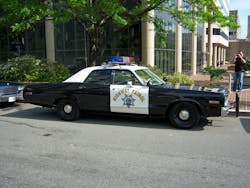Contributed by Tom Kanewske, VP of Business Development at Derive Systems.
Though older police vehicles are often transitioned to become administrative or training vehicles once they reach a certain age or mile limit; in many cases it is more cost effective to purchase new vehicles than continue to utilize them past their prime. The older a vehicle is, the more expensive it is to maintain. If not well managed, such operating costs of old vehicles can become a considerable sink in your budget.
Fueling costs for older models can also become an excessively large expenditure. Many police departments say fueling is one of, if not the, largest costs in their budgets. The City of Detroit, for example, reported spending $10 million on fuel in 2010. In many cases, it is actually more cost effective for a department to purchase new, fuel-efficient vehicles than it is to maintain a fleet of older models. Fleet managers need to continuously evaluate the economic life of their vehicles to ensure that older models are replaced at the optimal time to save the department money.
For example, the Crown Victoria—once the king of police vehicles—is not nearly as efficient or effective as the new Ford Police Interceptor. The new Police Interceptor sedan uses 20 to 25 percent less gasoline than the Crown Victoria police car, which could save a department thousands of dollars per vehicle over the course of a year. In fact, in 2013 the Urban Institute conducted a study to compare the fuel costs of traditional diesel patrol cars and newer hybrid police models. Evaluating the average fuel usage of both types of vehicle they calculated that even including the average purchase costs of both types of vehicle the hybrid models would save a department around $21,000 in a five-year period.
Fuel-efficient vehicles often show a surprising return on investment over time. These vehicles reduce fuel consumption and release fewer emissions into the air. Additionally, better gas mileage means that vehicles have a longer street life and won’t need to be replace as quickly as their predecessors.
Budget restricted? What then?
New technologies, such as engine calibration software, can help law enforcement agencies cut spending and reduce emissions without the high price seen with a new vehicle purchase. Not only can aftermarket products such as engine software calibrations be more cost effective, they can also improve vehicle performance. A North Carolina State University study conducted in 2012 recalibrated engines in four vehicles. After testing on both local roads and freeways, this study found that idling RPM in park/neutral reduced by about 25 percent. Furthermore, they found that fuel savings for the vehicles was improved by eight percent overall. Similarly, after investing in engine calibrations to tweak powertrain management and vehicle performance, the Port St. Lucie Police Department, saw a 12 percent reduction in idle fuel consumption, an 11 percent decrease in total spending on fuel, and a carbon footprint reduction of 200 pounds per vehicle per month. The department cited a return on investment in only one year.
Technology will be the answer to either maximize mileage on existing vehicles using engine calibration software or to wholly transition to newer, more efficient vehicles—departments can then focus on policing versus the constant chase and analysis for fuel savings.

Tom Kanewske | Business Development Manager
Tom Kanewske is the Vice President of Business Development at Derive Systems. With a focus on providing fleets unmatched value through validated fuel savings, Tom has guided Derive Systems’ fleet division, Derive Efficiency, since 2014. Prior to Derive, Tom served as a subject matter expert for the US Air Force and subsequently Northrop Grumman, where he worked to secure international defense sales and ensured broad technology protection measures were in place.
Tom holds a BS in Environmental Engineering from the US Air Force Academy and a Master’s in Public Policy, specializing in international relations and negotiations from Johns Hopkins University.



